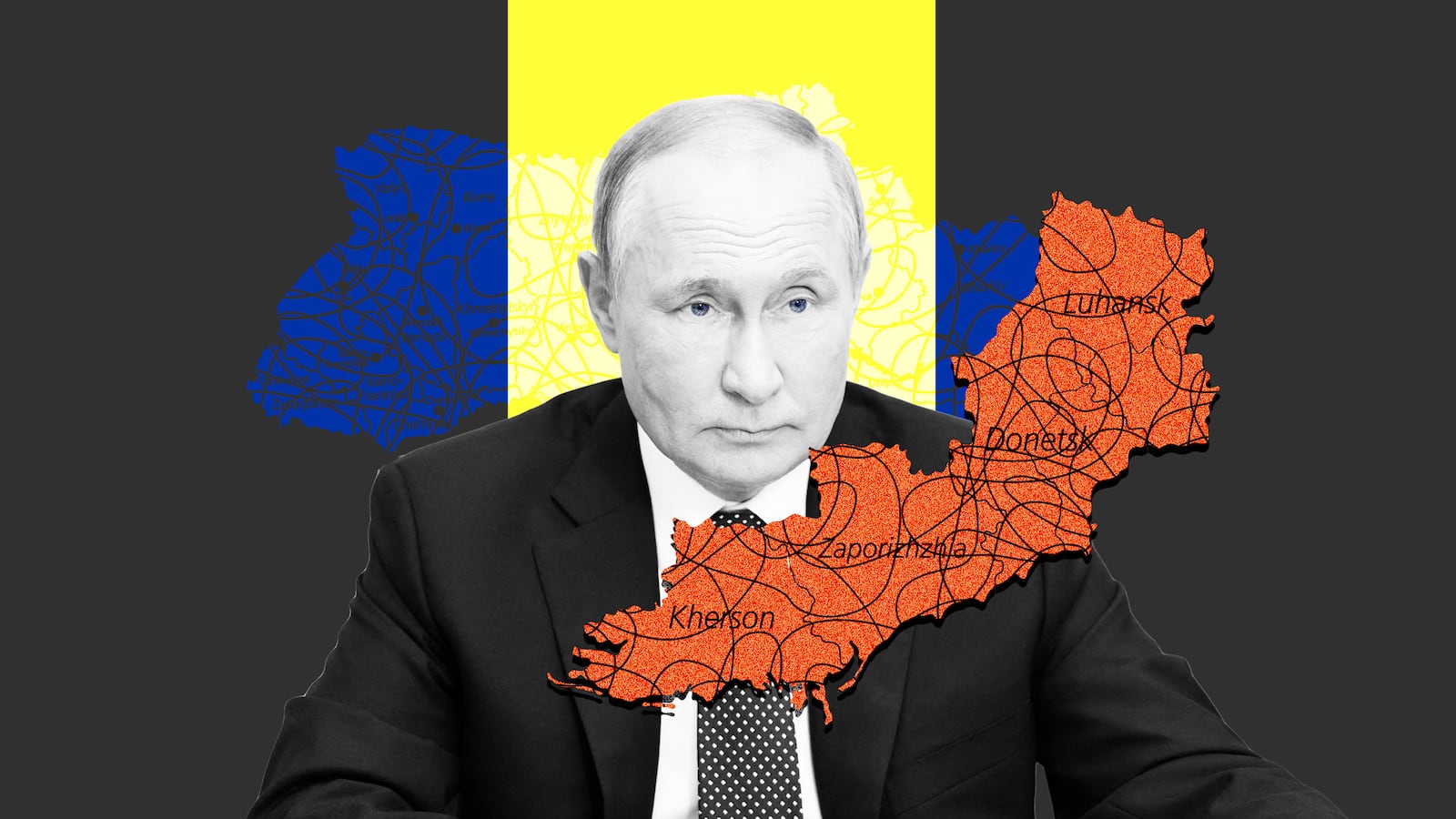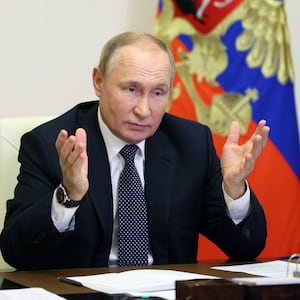President Vladimir Putin signed decrees on Wednesday formally recognizing Russia’s illegal annexation of four territories in Ukraine. The Kremlin is touting the move as a success—but beneath the veneer of calm and victory, hesitations are emerging that show Moscow isn’t ready to declare the borders stable just yet.
The Kremlin, for one, has begun to admit that it isn’t capable of defining clearly which borders it recognizes for the supposedly annexed territory right now.
Kremlin spokesman Dmitry Peskov clarified Tuesday that Moscow isn’t confident in which territories it considers Russian following the annexation.
“Certain territories will be reclaimed, and we will keep consulting residents who would be eager to embrace Russia,” Peskov said again Wednesday, according to the AP.
The seeming confusion about the borders of the newly annexed territory coincides with Ukrainian armed forces making gains in regions that Russia has supposedly claimed as its own, which is railroading attempts to present total control.
While Russia has supposedly annexed Ukraine’s Donetsk, Luhansk, Kherson, and Zaporizhzhia regions, Ukraine has been making steady gains in each. Just this weekend, Ukrainian forces liberated Lyman, in Donetsk, and have been approaching the borders of Luhansk Oblast, according to a British intelligence assessment shared Wednesday.
Earlier this week, Ukrainians have destroyed four Russian sites in Kherson, Mykolaiv, Dnipropetrovsk, and Zaporizhzhia, according to the Operational Command South.

Ukrainian security forces on patrol after Russian forces withdrew from the city of Lyman in the Donetsk region, Ukraine, on Oct. 5, 2022.
Metin Aktas/Anadolu Agency via Getty“The Ukrainian army is carrying out a pretty fast and powerful advance in the south of our country as part of the current defense operation,” Ukrainian President Volodymyr Zelensky said in a Tuesday address. “Dozens of settlements have already been liberated from the Russian sham referendum this week alone. In Kherson region, Kharkiv region, Luhansk region and Donetsk region altogether.”
Ukrainian forces’ momentum began to build last month with counterattacks in the south and northeast of the country, forcing Russian troops into retreat.
“Our warriors do not stop. And it’s only a matter of time before we oust the occupier from all our land,” Zelensky said.
The United States and other allies have pointed out repeatedly that Russia’s annexation attempts violate international law, and they have denounced the move. The referenda, which were taken to supposedly poll whether residents in the Ukrainian regions supported being a part of Russia, are widely seen as illegitimate. In some cases, residents reported being pushed to vote at gunpoint.

A man casts his ballot for a referendum at a polling station in Mariupol on Sept. 27, 2022.
AFP via GettyThe Kremlin’s pause in recognizing its new border has raised questions about whether Russia is hoping to conduct more sham referenda. When asked about the issue, Peskov declined to say whether Russia was planning to illegally annex more Ukrainian territories.
Putin himself acknowledged that some of the future of the illegally annexed territories remains uncertain: “We are working on the assumption that the situation in the new territories will stabilize,” Putin said Wednesday. According to the Russian Duma, defining the borders of at least municipalities in the regions should be done within six months.
Even as the Russians’ hold on the territories remained shaken, Putin attempted to paint a picture of effectiveness and calm. “In all honesty, the results of the referendum not only pleased me, but also surprised me,” Putin said, adding that the Russian retreats are not in contradiction with the annexations, according to Reuters.

Spectators listen to President Vladimir Putin marking the declared annexation of the Russian-controlled territories of Ukraine’s Donetsk, Luhansk, Kherson, and Zaporizhzhia regions in Red Square, Moscow, Russia, on Sept. 30, 2022.
Pool via ReutersThe votes from the territories are “more than convincing” and “absolutely transparent and not subject to any doubt,” he claimed.
And while the Kremlin sorts out its line on what the illegal annexations mean, their ability to pushback on Ukrainian gains is clearly lacking. Russian troops don’t have enough men to defend the land that they took, Alexander Kots, a military correspondent embedded with the Russians, said in a Telegram post. A “tough period” lies ahead, Kots said.
In a recognition of the faltering manpower, Russia announced a partial mobilization late last month to replace lost troops. But the mobilization hasn’t been all the Kremlin cracked it up to be; it prompted hundreds of thousands of Russian men to flee the country to evade conscription, and the men that are being sent to the front are in some cases not being trained or properly supplied.

People wait in line during food and medical distribution in the recently retaken town of Lyman in the Donetsk region on Oct. 5, 2022.
Yasuyoshi Chiba/AFP via GettyPart of Russia’s problems on the battlefield stems from a lack of global support on the world stage, according to the Pentagon. Just this week, the Biden administration announced an additional $625 million in military assistance for Ukraine. And while Ukraine is able to lean on the United States and countless European allies for additional weapons and military assistance, Russia has only a handful of countries it can turn to to bolster its war effort.
“Russia is turning to North Korea for assistance, it’s turning to Iran,” Deputy Assistant Secretary of Defense Laura Cooper said Tuesday in a briefing with reporters. “It doesn’t have that depth of support.”






